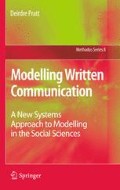Abstract
This chapter gives an account of the practical application of the modelling, NEWT, the Writing Tutor Program. Both applied models provided “blueprints” for the Writing Tutor Program, the first, in terms of its pedagogical value, with helpful specific advice and guidance, the second, in terms of its algorithmic expression and the input option, which allowed local social criteria to be captured. Computer programming is not a forgiving mode, and represents social processes only to the extent to which they have been represented accurately – and comprehensively – in the original design. Once a social process has been expressed in algorithmic terms, however, the concomitant algorithms involved in programming can be brought into play to represent the process faithfully to the intended user. The second applied model represented composing as a social algorithm, and the software could then replicate this algorithm in machine language. While this particular form of practical application may seem to occupy a small area of the options available in the general scheme of things, it is in fact the most powerful application as a force for social transformation, as a computer program can easily be disseminated worldwide.
Access this chapter
Tax calculation will be finalised at checkout
Purchases are for personal use only
Notes
- 1.
Collect your thoughts, Create, Chop n’ change, Correct and Criticise.
References
Ahmad, K., Corbett, G., Rogers, M. & Sussex, R. (1985) Computers, language learning and language teaching. Cambridge: Cambridge University Press.
Alessi, S.M. & Trollip, S.R. (1991) Computer-based instruction: methods and development (2nd Edition). Englewood Cliffs, NJ: Prentice-Hall.
Blunt Bugental, D. (2000) Acquisition of the algorithms of social life: a domain-based approach. Psychological Bulletin 126(2):187–219.
Burch, T.K. (2002) Computer modelling of theory, explanation for the 21st century. In R. Franck (ed.) The explanatory power of models: bridging the gap between empirical and theoretical research in the social sciences. Norwell, MA: Kluwer Academic Publishers.
Franck, R. (2002) The explanatory power of models: bridging the gap between empirical and theoretical research in the social sciences. Methodos Series, Vol. 1. Norwell, MA: Kluwer Academic Publishers.
O’Brien, P. (1993) eL: using AI in CALL. In M. Yazdani (ed.) Multilingual multimedia. Oxford: Intellect Books.
Pellone, G. (1995) Educational software design: a literature review. Australian Journal of Educational Technology 11(1):64–84. http://www.ascilite.org.au/ajet/ajet11/pellone.html (11 December 2004).
Pratt, D.D. (2003) The making of CourseMaker, a web-based shell program which can be set up by the teacher to run online courses. Paper presented at the SACOMM Conference. DIT, Durban, South Africa, 25–27 June 2003.
Pratt, D.D. (2005a) Social mechanism and software design: the use of a stochastic social-process algorithm in the design of a writing tutor program. Proceedings of the 3rd International Conference on Computer Science and its Applications (ICCSA-2005). San Diego, CA, USA, 27–30 June 2005:249–254.
Wyatt, D.H. (1984) Computer-assisted language instruction: present state and future prospects. In D.H. Wyatt (ed.) Computer-assisted language instruction. Oxford: Pergamon Press.
Author information
Authors and Affiliations
Corresponding author
Rights and permissions
Copyright information
© 2010 Springer Science+Business Media B.V.
About this chapter
Cite this chapter
Pratt, D. (2010). The Writing Tutor Program. In: Modelling Written Communication. Methodos Series, vol 8. Springer, Dordrecht. https://doi.org/10.1007/978-90-481-9843-6_8
Download citation
DOI: https://doi.org/10.1007/978-90-481-9843-6_8
Published:
Publisher Name: Springer, Dordrecht
Print ISBN: 978-90-481-9842-9
Online ISBN: 978-90-481-9843-6
eBook Packages: Humanities, Social Sciences and LawSocial Sciences (R0)

